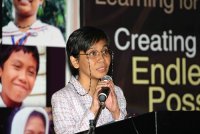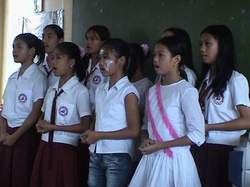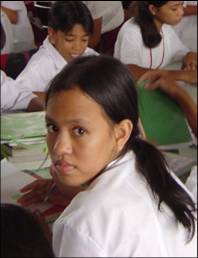

Social Responsibility in Secondary Education
por Pinky CASTELO CUPINO
Temas fortes ligados:
Educação e responsabilidade .
Temas largos ligados:
Crianças .
Educação .
Schools .
Teachers .
Youth .
SEAMEO-INNOTECH International Conference, Quezon City, Philippines, November 15-17, 2006
Invited to speak during the 10th SEAMEO-INNOTECH International Conference held in Quezon City, Philippines, last November 15-17, 2006, I had the opportunity to present the Charter for Human Responsibility. SEAMEO INNOTECH is short for Southeast Asian Ministers Regional Center for Innovative Education and Technology. (http://www.seameo-innotech.org/)
Theme of the Conference was "Learning for Life: Creating Endless Possibilities in Secondary Education”.
The objectives were to:
1) Share and examine on-going discourse on the issues and challenges facing secondary education in Southeast Asia;
2) Highlight and promote understanding of successful secondary education models, as well as alternative learning modalities for secondary education; and
3) Explore and probe possibilities of enriching secondary school partnership and collaboration with community stakeholders.
Theme strands included:
1. RETHINKING Secondary Education. This strand focuses on on-going conversations in secondary education that focuses on the issues of:
![]() designing secondary curricula to respond to workplace requirements
designing secondary curricula to respond to workplace requirements
![]() balancing general and vocational education
balancing general and vocational education
![]() linking vocational education to tertiary education
linking vocational education to tertiary education
![]() reforming assessment and making it relevant to post-secondary options
reforming assessment and making it relevant to post-secondary options
2. DECONSTRUCTING Secondary Education. This strand examines case studies of successful secondary education models and highlights their best features and factors for success. These models may fall under the following categories:
![]() Academic education
Academic education
![]() Career preparation (technical, entrepreneurial and agricultural skills development)
Career preparation (technical, entrepreneurial and agricultural skills development)
![]() Alternative learning systems / progressive life skills
Alternative learning systems / progressive life skills
3. RECONNECTING Secondary Education. This strand looks into the context of secondary education and examines models of school partnership with community stakeholders. Topics include:
![]() Engaging the family and the private sector
Engaging the family and the private sector
![]() Bridging societal divides through secondary education
Bridging societal divides through secondary education
![]() Nurturing a culture that promotes respect for diversity and social harmony through secondary education
Nurturing a culture that promotes respect for diversity and social harmony through secondary education

- Center for Positive Futures, a high school for the economically disadvantaged
I spoke on Deconstructing Secondary Education, presenting a paper and a powerpoint presentation on “Center for Positive Futures: Shaping Social Responsibilities in Secondary Education” (http://www.seameo-innotech.org/ic06/download2.htm). In the paper, I argued that education is a Social Development Responsibility and cited one of the Charter’s principles: “The full potential of knowledge and know-how is realized only through sharing them, and through using them in the service of solidarity and the culture of peace.”
In the powerpoint presentation, I quoted a few lines on the Charter introduction. “Never before have human beings had such far-reaching impacts on one another’s social, political, economic and cultural lives. Never before have they possessed so much knowledge, and so much power to change their environment. And yet, the social institutions which should enable these new challenges to be met are working less and less well. In this context, every one of us must take up his or her responsibilities at both the individual and the collective level. Throughout human history, traditions of wisdom - religious and otherwise - have taught values, to guide human behaviour towards a responsible attitude; their basic premise - still relevant today - has been that fundamental change in society is impossible without fundamental change in the individual. We have to respect for all forms of life - the right to a life of dignity, a preference for dialogue rather than conflict, compassion and consideration for others, solidarity and hospitality, truthfulness and sincerity, peace and harmony, justice and equity, and a preference for the common good sooner than self-interest.”
I ended by saying that “Education is a powerful medium that has the potential to affect the health, livelihood, security, and culture of the students, their parents and the community. There is NO OTHER WAY but for public and private school institutions to be involved in the bigger context, and to take responsibilities beyond academic development. THE RESPONSIBILITIES MAY BE DAUNTING BUT THE POSSIBILITIES ARE ENDLESS.”
You can read the whole presentation of Pinky Castelo Cupino by clicking here : Center for Positive Futures: Shaping Social Responsibility in Secondary Education



